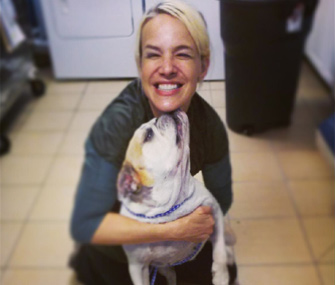Adventures in Pet Fostering: The Ups and Downs of Part-time Animal Ownership
Published on May 08, 2014

Last week I suffered a setback in my side job as a foster mom. After placing an adorable, 8-year-old English Bulldog in what I hoped would prove her forever home, she came back. Lulu’s rehoming had lasted all of seven days. It simply wasn't a good fit.
Owner-pet incongruence ranks high among the common pitfalls of being a foster owner, which makes sense: Misjudging the match is easy when so many variables are involved.
- Will there be getting-to-know-you mishaps the husband/wife/housemate(s) won’t abide? For example, temporary blips in housebreaking can be a deal breaker for many.
- Will the kids play nice? Or will they poke their new pet mercilessly until she acts out?
- Will the other dogs accept her? Or will they pounce on the perceived interloper?
These mis-fit factors can trash an otherwise made-in-heaven adoption placement. But finding a perfect forever home is just one of the challenges of fostering. As I can attest from my 20-plus years of experience, there are plenty more pitfalls besides mismatches.
Fortunately, however, there are more pluses than minuses in the fostering formula. Fostering is among the more worthwhile endeavors an animal lover can undertake, which is why I urge everyone with the desire, space, energy, attitude and means to consider the occasional shift as a foster owner. After all, how better to find a pet the perfect home than to play one-on-one matchmaker?
A Few Words of Advice
Before you begin, here’s a rundown of the issues foster owners can encounter on their adventures:
1. Falling in love. It’s as easy as you might expect. Prepare yourself for learning to love your foster — and to let her go. As someone who’s done it scores of times, I can tell you that it’s never easy. It may smart, but the good news is that a forever placement is a worthy reward for your temporary suffering.
2. The expense. It takes more than love to keep a foster animal. Because all of my foster pets show up as medical “disasters” best suited for a veterinarian to take on, they’re especially expensive. I do, however, have a knack for soliciting donations of special diets from pet food manufacturers, low-cost surgeries from local specialists and high-end meds from drug distributors. Even so, it can be pricey.
3. Sweat equity. The money is just the tip of the iceberg. Anyone interested in fostering should know that keeping foster pets typically amounts to more work than having permanent pets. They’re almost always needier, more stressed out, medically demanding and behaviorally problematic. Be sure you have the time and energy to dedicate to them.
4. Interpet jealousy. Do your pets have what it takes to take on a foster, too? Pets who can’t abide anyone touching their toys, for example, need not apply. Easygoing pets happy to take on a new playmate yet willing to leave an anxious one alone make the best foster siblings.
But also understand that your foster pet may act out in unexpected ways. You have to be capable of exercising your wits and maintaining a flexible outlook on the whole enterprise. Separating dogs, isolating cats, playing switcheroo with feeding times and exercise schedules — they are all possibilities your foster might impose upon you and your perma-pets.
5. Other domestic evils. The truth is that the whole household has to be on board with fostering — humans, especially. There’s no worse time to learn that your new boyfriend was once bitten by a Chihuahua and holds a lifetime grudge than after you’ve taken one on.
6. A flexible timeframe. You may not be able to find your foster the absolute best home for many, many, many months. I’ve gotten lucky and found a home within a week or two (pups go faster), but most of my older adult fosters have lived with me for three to nine months. That's long enough for some people to become less willing to part with an adored "temporary" pet, which makes finding a forever home a greater challenge. Not only do you start to market her less diligently, you’re also way choosier when interviewing prospective owners.
Which brings me back to Lulu.
Sometimes a Revolving Door
It’s not as if I hadn’t done my due diligence in selecting the right owner. Much as she was willing to take Lulu on (despite the dog's chronic medical problems), her canine housemate was having none of it. Several vicious attacks confirmed it.
In the end, many tears were shed (though not by me), and Lulu was returned to me with scabs on her head. But she didn’t seem to care about her Franken-dog look; she was happy to wag herself back into my arms.
Sure, it was a stumbling block — especially given my plans to take on yet another English Bulldog medical “disaster.” But even abject failures have their silver linings: I get to live with someone so lovable for another month or two.
Let’s just hope that’s all it takes before another potential owner falls for Lulu's charms.
More on Vetstreet.com:





